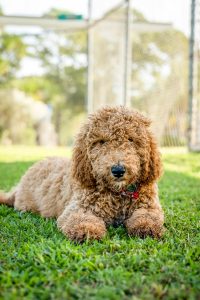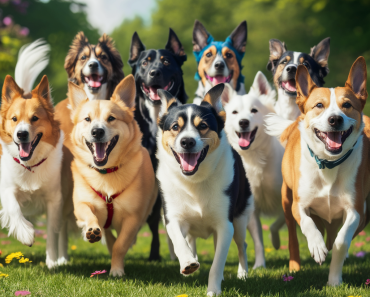Are you considering bringing a new dog into your life but unsure which breed would be the best fit? Finding the ideal dog breed is a crucial step that ensures both you and your future furry friend will enjoy a happy and harmonious relationship. Our comprehensive guide, “We’ll Find Your Ideal Dog Breed,” is designed to help you navigate this important decision. Read on to discover how we can match you with the perfect canine companion.

ideal dog breed
Why Finding the Right Dog Breed Matters
Choosing the right dog breed is a critical decision that can significantly impact your life and the well-being of your future furry friend. It goes beyond simply selecting a cute puppy; it involves understanding how a dog’s characteristics align with your lifestyle, preferences, and expectations. Here’s why finding the right dog breed matters:
Compatibility with Your Lifestyle
Every dog breed has unique needs and traits. Some dogs require extensive exercise, while others are content with minimal activity. Matching a dog’s energy level with your lifestyle is crucial:
- Activity Level: High-energy breeds, such as Border Collies and Siberian Huskies, thrive with active owners who enjoy running, hiking, or other outdoor activities. In contrast, breeds like Bulldogs and Shih Tzus are better suited for more relaxed, indoor lifestyles.
- Living Space: Larger breeds like Great Danes or Saint Bernards may struggle in small apartments, whereas smaller breeds like Chihuahuas or French Bulldogs adapt well to confined spaces.
Ensuring a Happy and Healthy Relationship
A well-matched dog is more likely to be happy, healthy, and well-behaved. Consider the following factors:
- Temperament: Different breeds have different temperaments. For instance, Golden Retrievers are known for their friendly and tolerant nature, making them great for families with children. Conversely, breeds like the Chow Chow may be more reserved and independent.
- Grooming Needs: Some breeds, like Poodles, require regular grooming and maintenance, which can be time-consuming and costly. Others, like Beagles, have lower grooming needs.
Meeting Specific Needs and Preferences
Choosing the right breed can help meet specific personal or family needs:
- Allergies: Hypoallergenic breeds like the Bichon Frise or Poodle are ideal for families with members who have allergies to pet dander.
- Companionship: Some breeds are more sociable and thrive on human interaction, such as the Labrador Retriever. Others, like the Basenji, are more independent and can tolerate being alone for longer periods.
Long-Term Commitment and Responsibility
Adopting a dog entails a significant, long-term commitment that often extends for over a decade. Ensuring you choose the right breed can prevent future issues and potential rehoming:
- Health Concerns: Each breed has its own set of common health issues. Researching and understanding these can help you prepare for future veterinary care and potential expenses.
- Lifespan: Smaller breeds often live longer than larger breeds. Understanding the expected lifespan of a breed can help you plan for a long-term relationship.
Enhancing Your Quality of Life
The right dog can bring immense joy and enhance your quality of life. A well-matched dog can provide:
- Companionship and Emotional Support: Dogs are known for their loyalty and ability to provide emotional support. The right breed can become a cherished companion who enriches your life.
- Security and Protection: Certain breeds, such as the German Shepherd or Rottweiler, are excellent guard dogs and can offer a sense of security for you and your family.
How We Help You Find Your Ideal Dog Breed

ideal dog breed, ideal dog breed
Finding the perfect dog breed to match your lifestyle and preferences can be a daunting task, but we make it easy and enjoyable with our comprehensive approach. Our process is designed to ensure you find a canine companion that fits seamlessly into your life. Here’s how we help you find your ideal dog breed:
Personalized Quiz: Tailored to Your Needs
Our process begins with a detailed, 20-question quiz designed to gather essential information about your lifestyle, preferences, and expectations. Here’s what our quiz covers:
- Living Situation:
- Are you residing in an apartment, a house with a yard, or a rural area?
- Activity Level:
- Are you an active person who enjoys outdoor activities, or do you prefer a more sedentary lifestyle?
- Family Dynamics:
- Do you have children or other pets residing in your home?
- Experience with Dogs:
- Are you a first-time dog owner, or do you have previous experience with dogs?
- Allergies:
- Do you or any of your family members have allergies to pet dander?
Expert-Driven Recommendations
Our recommendations are based on extensive research and insights from veterinarians, dog trainers, and animal behaviorists. This ensures that the breeds we suggest are not only compatible with your lifestyle but also healthy and well-suited to your specific needs.
- Behavioral Traits:
- We consider the temperament and behavior of different breeds to ensure they match your personality and family dynamics.
- Health Considerations:
- We take into account common health issues associated with each breed, helping you prepare for potential medical needs.
Detailed Breed Profiles
Once you complete the quiz, you’ll receive detailed profiles of the breeds that best match your responses. These profiles include:
- Temperament and Behavior:
- Information on the breed’s typical behavior, energy level, and compatibility with children and other pets.
- Grooming and Maintenance:
- Insights into grooming needs, shedding, and overall maintenance requirements.
- Health and Lifespan:
- Common health issues and the average lifespan of the breed.
- Training and Socialization:
- Tips on training and socializing your new dog to ensure a well-behaved and happy pet.
Practical Advice for Adopting Your Dog
We provide comprehensive advice to help you prepare for bringing your new dog home:
- Choosing a Reputable Source:
- Guidance on finding responsible breeders or reputable rescue organizations.
- Preparing Your Home:
- Tips on puppy-proofing your home and gathering essential supplies like crates, beds, food, and toys.
- Training and Socialization:
- Starting early with training and socialization to ensure your dog adapts well to different environments and experiences.
Ongoing Support and Resources
We don’t just stop at helping you find the right breed; we also provide ongoing support and resources to ensure you and your dog have a fulfilling relationship:
- Training Tips:
- Access to articles and videos on effective training techniques.
- Health and Wellness:
- Information on maintaining your dog’s health through proper diet, exercise, and regular veterinary care.
- Community and Support:
- Join our community of dog owners to share experiences, ask questions, and get advice from other pet parents.
Popular Dog Breeds and Their Traits

ideal dog breed, ideal dog breed
Choosing the right dog breed is a crucial step in ensuring a happy and fulfilling relationship with your new pet. Different breeds come with unique characteristics, temperaments, and needs. Here’s a closer look at some of the most popular dog breeds and their distinctive traits to help you find your ideal match.
Labrador Retriever
Traits: Friendly, Energetic, Loyal
- Size: Medium to Large
- Activity Level: High
- Grooming Needs: Moderate (regular brushing)
- Lifespan: 10-12 years
- Ideal For: Active families, those with children, and individuals who enjoy outdoor activities
Labrador Retrievers are renowned for their friendly and outgoing nature. They are highly energetic and require plenty of exercise, making them perfect for active families. Labradors are also excellent with children and other pets, and their loyalty makes them wonderful companions.
German Shepherd
Traits: Intelligent, Protective, Versatile
- Size: Large
- Activity Level: High
- Grooming Needs: Moderate (regular brushing, seasonal shedding)
- Lifespan: 9-13 years
- Ideal For: Active owners, those looking for a working or guard dog, and families with older children
German Shepherds are intelligent and versatile dogs, often used in police and military roles due to their trainability and protective nature. They require regular mental and physical stimulation and thrive in environments where they can have a job or purpose.
French Bulldog
Traits: Affectionate, Adaptable, Playful
- Size: Small
- Activity Level: Low to Moderate
- Grooming Needs: Low (occasional brushing)
- Lifespan: 10-12 years
- Ideal For: Apartment dwellers, families with children, and individuals looking for a low-energy companion
French Bulldogs are celebrated for their affectionate and playful demeanor. They are well-suited for apartment living due to their small size and relatively low exercise needs. French Bulldogs are great companions and get along well with children and other pets.
Golden Retriever
Traits: Friendly, Gentle, Intelligent
- Size: Medium to Large
- Activity Level: Moderate to High
- Grooming Needs: Moderate to High (regular brushing)
- Lifespan: 10-12 years
- Ideal For: Families with children, active individuals, and those looking for a friendly and trainable dog
Golden Retrievers are beloved for their gentle and friendly nature. Their high intelligence and trainable nature make them superb family companions. Goldens require regular exercise and enjoy activities like fetch and swimming.
Poodle
Traits: Intelligent, Hypoallergenic, Versatile
- Size: Standard, Miniature, or Toy
- Activity Level: Moderate to High
- Grooming Needs: High (regular professional grooming)
- Lifespan: 12-15 years
- Ideal For: Families with allergies, those looking for a trainable dog, and active individuals
Poodles are highly intelligent and come in three sizes: Standard, Miniature, and Toy. Their hypoallergenic quality renders them suitable for families with allergies. Poodles are versatile and excel in various activities, including obedience and agility training.
Beagle
Traits: Curious, Friendly, Energetic
- Size: Small to Medium
- Activity Level: Moderate to High
- Grooming Needs: Low (regular brushing)
- Lifespan: 12-15 years
- Ideal For: Families with children, active individuals, and those looking for a sociable dog
Beagles are known for their curious and friendly nature. They are energetic and require regular exercise to keep them happy and healthy. Beagles are great with children and make excellent family pets, but their strong sense of smell means they can be prone to wandering.
Bulldog
Traits: Calm, Courageous, Friendly
- Size: Medium
- Activity Level: Low to Moderate
- Grooming Needs: Low (occasional brushing)
- Lifespan: 8-10 years
- Perfect for apartment dwellers, families with children, and individuals seeking a low-energy companion.
Bulldogs are recognized for their tranquil and amiable temperament. They are well-suited for apartment living due to their low energy levels. Bulldogs are great companions and are particularly good with children, making them excellent family pets.
Dachshund
Traits: Lively, Courageous, Independent
- Size: Small
- Activity Level: Moderate
- Grooming Needs: Varies by coat type (smooth, longhaired, or wirehaired)
- Lifespan: 12-16 years
- Ideal For: Families with older children, apartment dwellers, and those looking for a small, spirited dog
Dachshunds, affectionately termed ‘wiener dogs,’ exhibit lively and courageous traits. They come in three coat types: smooth, longhaired, and wirehaired, each with different grooming needs. Dachshunds are independent and make excellent companions for those looking for a small, spirited dog.
Tips for a Successful Dog Adoption
Adopting a dog is an exciting and rewarding experience, but it also comes with responsibilities and considerations. Whether you’re adopting from a shelter, rescue organization, or breeder, these tips will help ensure a smooth transition and a successful adoption process:
1. Do Your Research
Before you adopt a dog, research different breeds to find one that matches your lifestyle, activity level, and preferences. Consider factors such as size, energy level, grooming needs, and temperament to ensure compatibility.
2. Consider Adoption
Consider adopting from a shelter or rescue organization. Many wonderful dogs are in need of loving homes, and adoption is a rewarding way to give a dog a second chance. Plus, shelters often provide valuable information about a dog’s personality and behavior.
3. Prepare Your Home
Prepare your home for your new dog’s arrival. Puppy-proofing is essential, especially if you’re adopting a young dog. Remove any potential hazards, secure loose cords and objects, and create a designated area with bedding, food, water, and toys.

ideal dog breed, ideal dog breed
4. Be Patient
Adjusting to a new home can be stressful for a dog, so be patient and give them time to acclimate. Establish a routine for feeding, potty breaks, exercise, and training to help your dog feel safe and secure.
5. Provide Proper Training
Training is fundamental for fostering a well-behaved and contented dog . Start with basic commands like sit, stay, and come, and use positive reinforcement techniques such as treats and praise. Consider enrolling in obedience classes or working with a professional trainer if needed.(ideal dog breed)
6. Socialize Your Dog
Expose your dog to different people, animals, environments, and experiences to help them become well-adjusted and confident. Gradually introduce them to new situations and provide plenty of positive reinforcement.
7. Schedule Regular Vet Visits
Arrange a veterinary check-up shortly after adopting your dog to confirm their health status and ensure they are current on vaccinations. Maintain regular vet visits for preventive care, vaccinations, and parasite control to keep your dog healthy and happy.(ideal dog breed)
8. Be a Responsible Owner
Commit to providing your dog with proper care, including nutritious food, regular exercise, mental stimulation, and affection. Make sure your dog is licensed and wears identification tags with your contact information at all times.
9. Show Love and Patience
Building a strong bond with your dog takes time, so be patient and show them love, kindness, and understanding. Spend quality time together, engage in interactive play, and build trust through positive reinforcement.(ideal dog breed)
10. Seek Support and Resources
Don’t hesitate to seek support and guidance from experienced dog owners, trainers, veterinarians, and online communities. Joining support groups and forums can provide valuable advice, encouragement, and camaraderie
Finding the right dog breed is an exciting journey that requires careful consideration and research. Our guide, “We’ll Find Your Ideal Dog Breed,” is designed to make this process easier and more enjoyable. By considering your lifestyle, preferences, and needs, we can help you find the perfect canine companion.(ideal dog breed)
Take the first step towards finding your ideal dog breed today and look forward to a rewarding and fulfilling relationship with your new furry friend!






